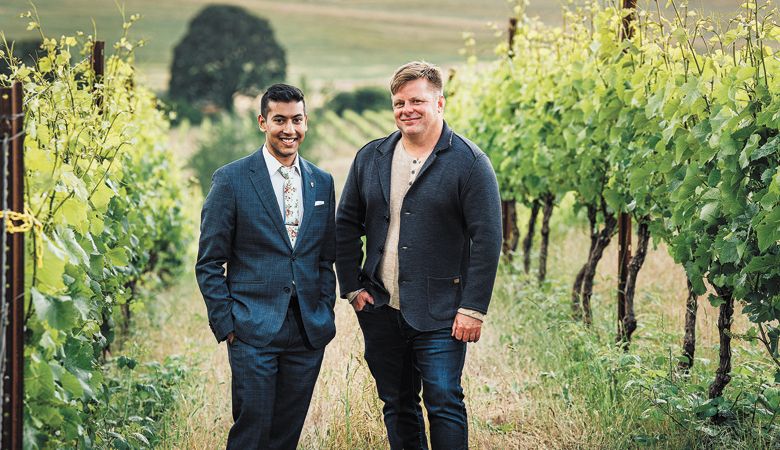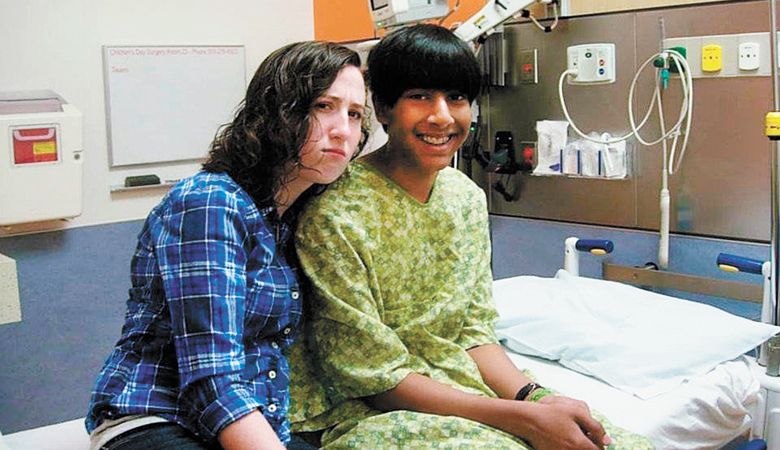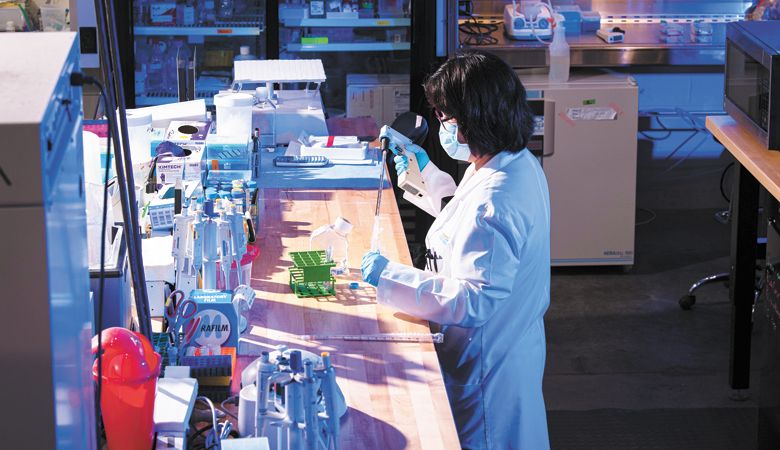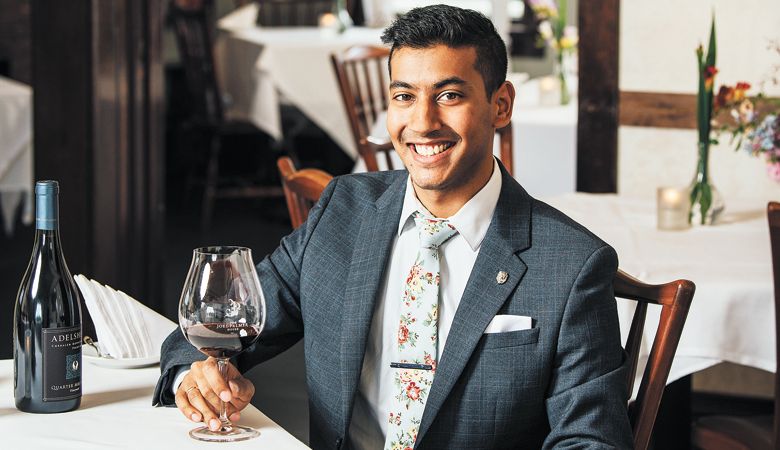Pouring it Forward
Sommelier’s cancer journey inspires wine collaboration for research
Childhood trauma frequently results in serious scars, taking years to soften and resolve. Part of the healing process can involve paying it forward, which is how Levi Seed deals with his past and embraces the future.
The assistant manager and lead sommelier at Dayton’s iconic Joel Palmer House underwent a brutal three-and-a-half-year battle with childhood leukemia. Today, he has several projects that combine his love of food and wine with his compassion for children battling illness. The latest is a private label made in partnership with Authentique Wine Cellars. Released in July, the wine will raise money for the small-but-mighty Children’s Cancer Therapy Development Institute (CC-TDI); the Beaverton organization is on a mission to make childhood cancer universally survivable.
Born in India and adopted by a couple in Hillsboro at five months, Seed was active in martial arts and enjoyed spending time with his adoring parents, an older sister with whom he was very close, and two older siblings.
But in 2008, he developed back problems and experienced extremely low energy. “I woke up one morning with this weird rash all up and down my chest and neck,” he says. After undergoing extensive bloodwork, Seed was rushed to Legacy Emanuel Medical Center in Portland. Doctors informed his parents he had acute lymphoblastic leukemia, the most common form of childhood cancer. He was 12 years old.

The first few weeks felt surreal. Seed, who kept hearing the word “leukemia” from doctors, didn’t really comprehend what was happening until one told him he would lose his hair. “I said, ‘Do I have cancer?’ They said yes, and that’s when it all hit me. I just shut down. I didn’t talk to anyone for two weeks except for my older sister.”
Between 2008 and 2011, Seed underwent multiple rounds of cancer treatment, many of which were excruciating. He remembers a monthly routine that involved getting more than 50 shots in each leg, and thick needles inserted into his spine to collect white blood cells. He almost died following an allergic reaction to a chemotherapy medication. At one point, exhausted and suffering, he told his parents he didn’t think he could do it anymore. They had a long talk about staying strong and focusing on his health so he could someday live a normal life.
Beyond the support of his family, what kept him going was the encouragement he received from other people. He hadn’t told most of his friends about his treatment, but he had informed the owner of his martial arts studio, Dan Haney of Ernie Reyes’ World Martial Arts in Hillsboro, why he had to stop attending. Haney, also a cancer survivor, rallied to help Seed; the studio raised money to help with his treatment. Haney visited regularly and told him he would waive all class fees once Seed could return to martial arts.
Dec. 15, 2011, Seed received his final chemo treatment. He’s been cancer-free ever since. While there is a risk of leukemia returning within five years of ending treatment, the chance of the dreaded disease returning after 10 years is basically zero.
That doesn’t mean it’s been an easy road for Seed. His intensive medical treatment left him with a weakened heart and liver. During chemotherapy, he received a dose of steroids that caused him to develop a serious bone disease disrupting his bone growth. He spent three months in a wheelchair before he was able to walk. It’s still painful to run for long distances, and one of his ankles still collapses on occasion.
Yet looking back, Seed says he wouldn’t change a thing about his life. “I would go through all the pain again because of all the incredible people I met. I wouldn’t be the person I am today without that experience.”
Getting his life back on track after treatment took some time. He returned to martial arts two months after stopping chemo and received his black belt a year later. But he’d missed his entire seventh-grade year and most of the next few years at school. His junior and senior years were focused on getting caught up so that he could graduate on time. He met his goal of finishing with his classmates and received a presidential award for academic achievement, nonetheless.
After Seed finished high school, he and his parents agreed it would be a good idea for him to take a year off. But three months into his break, he felt totally bored. To break him out of his funk, his dad and older sister signed him up for a tour of the Oregon Culinary Institute. “As a kid, I always wanted to be a chef,” he said. “Two weeks later, I was enrolled in their food and beverage program. That was the single best decision of my life.”
Despite his damaged liver, which hinders his ability to drink large amounts of alcohol, Seed took two wine courses in culinary school. He developed a passion for it—both the flavor and the sophistication of service. His instructor was a certified sommelier, and he encouraged Seed to continue his study with an eye on becoming a wine professional.
Seed took a couple of cooking jobs after school, but he eventually transferred to working in the front of the house rather than the back. He received his first-level sommelier certification in 2018 and worked for a number of restaurants, hotels and wineries before landing at the Joel Palmer House in 2020.
His cooking skills have been put to good use helping children who find themselves in the same situation he did a decade ago. For several years, Seed has donated a four-course dinner with wine pairing to an annual fundraising auction organized by the Sam Day Foundation. The group was started by a family friend and funds research on rare pediatric cancers. To date, these dinners have raised over $30,000. In 2019, The Sam Day foundation granted CC-TDI $150,000 to fund their CuRe-FAST tissue banking program.
For many rare cancer types, study models (cell lines and mouse models) do not exist, limiting research options and knowledge about these diseases. CuRe-FAST was established to meet this need and is unique in its direct partnership approach with pediatric cancer families, treating institutions and the global pediatric cancer research community. While other tumor banking programs exist, the majority are designed to simply store biological tissue samples and/or to determine patient eligibility for clinical trials. This results in very limited access of these samples being available to the scientific community for research purposes.
“At CC-TDI, not only do we store tumor and tissue samples, our team creates mouse models and cell lines to use in our own pediatric cancer studies and to share with researchers around the world,” says Dr. Charles Keller, CC-TDI’s scientific director. “We believe that ‘informed’ study models and a ‘low-barrier’ approach to study model access is what ultimately pushes research forward.”
Seed met Keller at a Sam Day event. The doctor invited him to tour the lab. Seed was so impressed, he volunteered to do a dinner/fundraiser, eventually joining CC-TDI’s board of directors in 2019.
But Seed wanted to do more. He was aware that the Children’s Cancer Fund had worked with Penner-Ash Wine Cellars and L’Angolo Estate to do private-label wines in which a portion of the proceeds from each sale were donated to the charity. Seed sought a winery partner willing to do the same for CC-TDI.
Enter Nicholas Keeler, owner and winemaker at Authentique Wine Cellars in the Eola-Amity Hills.
“My mom, dad and grandfather all had cancer, so it’s a cause that’s very important to me,” Keeler explains. “I have so much empathy for what people with cancer have to overcome and respect for their journey.”
He’s committed 20 cases of his top 2019 Authentique Keeler Estate Vineyard designate, “a beautiful expression of our Biodynamic vineyard,” Keeler says. Available on Authentique’s website, the wine’s price is $60 of which 50% will be donated to CC-TDI. The winemaker explains, “I told CC-TDI that if these wines sell out, I would be happy to label another 20 cases for their cause.” You can find the wine also at the Joel Palmer House in Dayton.
Seed hopes the wine will give people the satisfaction of supporting a good cause as well as the happiness that comes through meaningful sensory experiences. His greatest joy in life comes from good food and great wine, and he’s grateful to share that experience with others through work every day.
“Things are just things, but if you go and have an incredible meal, that’s something you’ll always remember,” he says. “After almost dying three times, I have the philosophy that life is just too short to do what you hate. I’m going to do what makes me happy. If we can give back to others in the process, all the better.”














